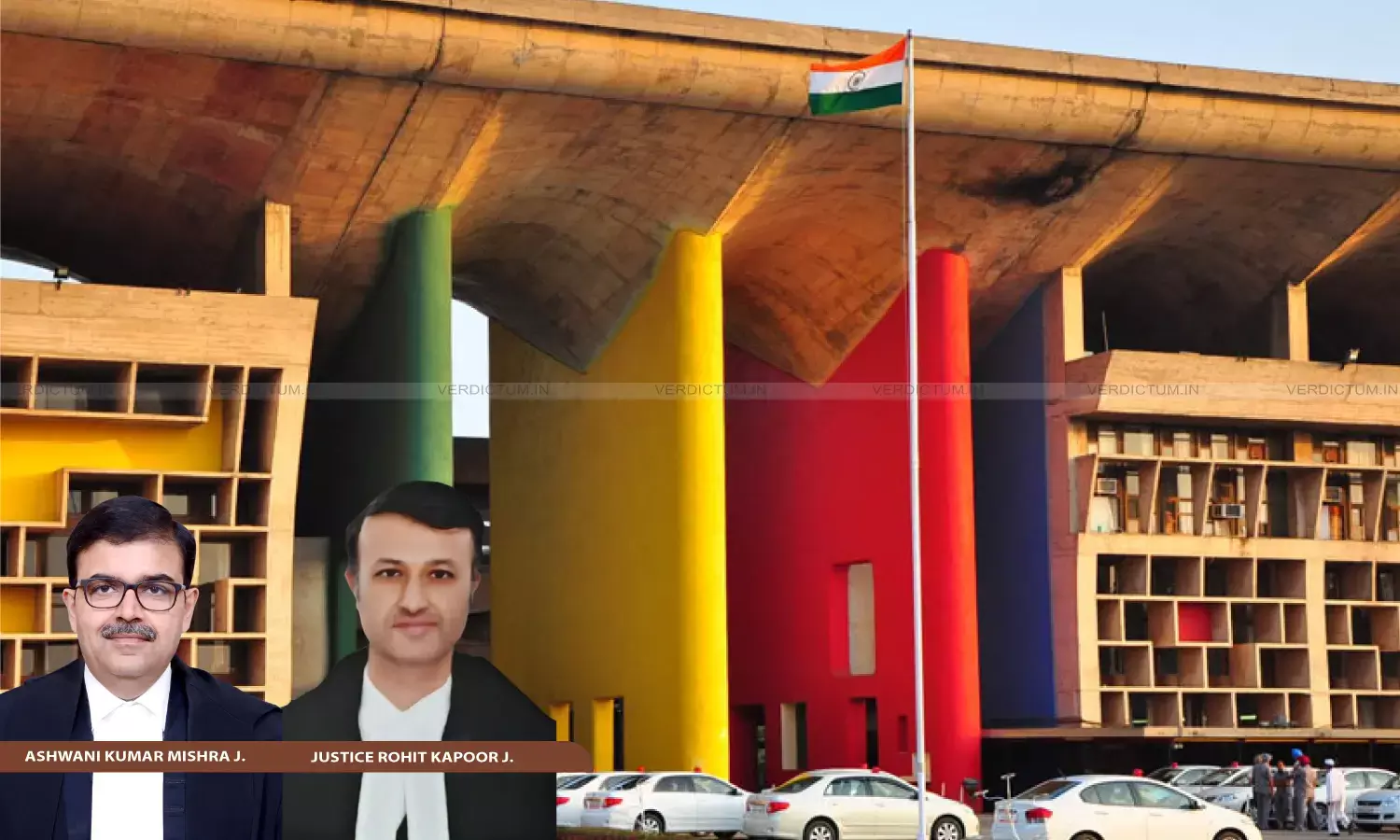State Policy: Punjab & Haryana High Court Rejects Plea Seeking 10% Reservation To EWS In LL.B. Course At Panjab University
The Petitioner belonged to the EWS category and was a candidate having qualified the LL.B. entrance examination conducted by the Panjab University by securing 256th rank.

Justice Ashwani Kumar Mishra, Justice Rohit Kapoor, Punjab and Haryana High Court
The Punjab and Haryana High Court has dismissed the Writ Petition seeking 10% reservation to Economically Weaker Sections (EWS) in admission to LL.B. 3-year course for the Academic Session 2025-2026 in the Department of Laws, Panjab University, Chandigarh.
The Petitioner namely Puneet Singh, hailing from a government-notified backward and border area in District Pathankot, Punjab and a member of EWS, had approached the Court.
A Division Bench comprising Justice Ashwani Kumar Mishra and Justice Rohit Kapoor observed, “The decision taken, not to implement EWS reservation in educational institutions is a part of policy of the State, which requires no interference. That being the case, we do not find any justification for this Court to take any different view once the controversy stands settled up to the Supreme Court.”
Advocate J. S. Virk represented the Petitioner, while Senior Panel Counsel Gurmeet Kaur Gill, Addl. AG T. P. S. Walia, Additional Standing Counsel Pritpal Singh Nijjar, Junior Panel Counsel Himanshu Malik, and Advocate Akshay Kumar Goel represented the Respondents.
Brief Facts
The Petitioner was a candidate having qualified the LL.B. entrance examination conducted by the Respondent-Panjab University by securing 256th rank. However, despite being eligible in every respect, he was allegedly deprived of the opportunity to secure a seat under the EWS category due to the omission of EWS reservation from the admission prospectus. As per the Writ Petition, the Respondent University failed to include reservation in its LL.B. 2025-2028 admission process, as reflected in the prospectus, thereby violating both constitutional and executive directives.
The Petitioner upon realizing the absence of EWS category in the application process sent repeated representations to the university via official emails, requesting incorporation of EWS reservation and option in the registration form and in prospectus. In response, he received an official email stating that no changes could be made to the form at that stage but the EWS category would be considered at the time of admission. Relying on this assurance, he paid the application fee and completed the registration process. He appeared for the entrance test and was declared successful in the result. However, during the subsequent admission process i.e., during counselling, no provision was made to allocate seats for EWS candidates. Being aggrieved, the Petitioner was before the High Court.
Contentions
The Petitioner submitted that such inaction amounts to an egregious constitutional and statutory default, denying him the chance to pursue legal education and career advancement solely on account of institutional difference. The Writ Petition claimed that the loss of one year cannot be restituted unless immediate and effective judicial intervention is undertaken. The counsel for the Petitioner contended that in view of the 103rd Constitutional Amendment Act, 2019 the 10% reservation for EWS ought to be given effect to, by the Respondent University, and the failure of the University to do so would require the Court to issue a Writ of Mandamus for implementing the provision relating to reservation for EWS.
On the other hand, the State filed its reply in which it was stated that the amendment introduced by 103rd Constitutional Amendment Act, 2019 merely enables the State to make provision for reservation for EWS. It was further stated that no mandamus can be issued for such purposes inasmuch as the decision of the State, not to implement the provision for EWS reservation, remains in the realm of policy of the State which cannot be interfered with in the facts of this case.
Earlier Orders
The Petitioner had faced a similar issue earlier with the Punjab Agricultural University and went to the High Court for appropriate directions. On October 3, 2023, the High Court’s Bench of then Chief Justice Ravi Shanker Jha and Justice Arun Palli had directed the Respondents to consider and decide the representation submitted by the Petitioner, in accordance with law. Thereafter, on August 22, 2024, the Bench of then Chief Justice Ravi Shanker Jha and Justice Anil Kshetarpal declined interference and disposed of the Petition.
Reasoning
The High Court in view of the facts, contentions, and earlier Orders, noted, “Reliance is placed upon a Division Bench judgment of this Court in Vyom Yadav v. Union of India and others, CWP-16520-2023. The judgment in Vyom Yadav (supra) has been followed in subsequent judgment of the Court in Komalpreet Kaur Dhillon v. Union of India and others, CWP-3200 2025 against which a Special Leave to Appeal preferred before the Supreme Court being SLP (C) No.21354-2025 has also been dismissed on merits. It is submitted that the principles of merger would apply and once the issue has been settled with the dismissal of the Special Leave to Appeal by the Supreme Court, this Court would not be justified in issuing any directions as is prayed for.”
The counsel for the Petitioner had submitted that the Judgment in Vyom Yadav case has not taken note of Section 72 of the Punjab Reorganization Act, 1966. In this regard, the Court said, “We are not impressed by the argument so advanced on behalf of the petitioner inasmuch as the import of the provisions of the Act of 1966 has been dealt with specifically in paragraph No.10 of the judgment in Vyom Yadav (supra). The Co-ordinate Bench has otherwise refused to issue a writ of mandamus on the ground that State is well within its right to implement EWS reservation in educational institutions or not.”
Accordingly, the High Court dismissed the Writ Petition.
Cause Title- Puneet Singh v. Union of India and Others (Neutral Citation: 2025:PHHC:146936-DB)


